English (Phonics, Reading, Writing)
Intent
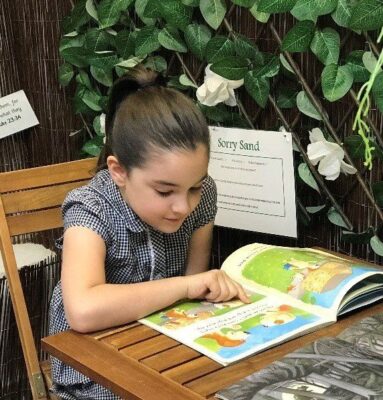 This curriculum aims to lay a strong foundation in English language proficiency by immersing pupils in quality literature from an early age and instil a lifelong love for reading and writing while nurturing essential language skills. Our curriculum revolves around core texts that serve as the heart of learning. These texts are carefully selected to engage the children and provide rich opportunities for language development. Through these core texts, children explore a range of genres, themes, and writing styles, fostering a deeper understanding of literature and language.
This curriculum aims to lay a strong foundation in English language proficiency by immersing pupils in quality literature from an early age and instil a lifelong love for reading and writing while nurturing essential language skills. Our curriculum revolves around core texts that serve as the heart of learning. These texts are carefully selected to engage the children and provide rich opportunities for language development. Through these core texts, children explore a range of genres, themes, and writing styles, fostering a deeper understanding of literature and language.
Our English curriculum is structured to guide students through a gradual progression of language skills; emphasis is initially placed on introducing phonics, developing early reading, vocabulary building and fundamental grammar concepts. As children advance, they develop reading comprehension, expand vocabulary and explore more complex grammar structures. Creative writing activities become more sophisticated, encouraging children to express themselves imaginatively. Ultimately, the focus shifts to refining reading fluency, enriching vocabulary through diverse texts, mastering grammar rules, and honing narrative and expository writing skills.
Thoughtfully chosen literature exposes children to characters, scenarios, and perspectives that resonate with their own experiences, while also providing glimpses into the lives of others.
Implementation
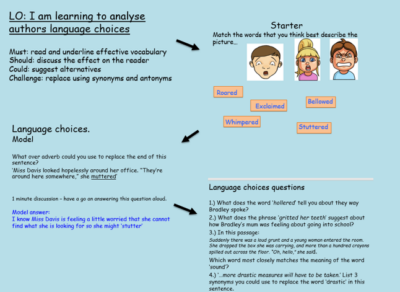 Reading
Reading
At St Joseph’s we believe reading is the key to unlocking the entire curriculum, therefore we prioritise reading across the whole school.
Reading at the centre: Reading is at the centre of our curriculum. To ensure children can access all that the curriculum and wider world has to offer; they must first be able to read. Reading fluently, with comprehension and for enjoyment allows children to engage with the world around them.
Implementing reading in a primary school entails a multifaceted approach aimed at nurturing a love for reading and cultivating crucial literacy skills among children. This involves creating an enriching reading environment within the school, including a well-equipped library and inviting reading corners in each classroom.
In EYFS and KS1, the children have daily Read, Write, Inc. (RWI) Phonics sessions which is a systematic synthetic phonics programme. Children learn to read with pleasure, fluency, accuracy and expression whilst developing their deeper understanding of why phonics is a big part of their day and can explain how and when they use phonics within their learning journey.
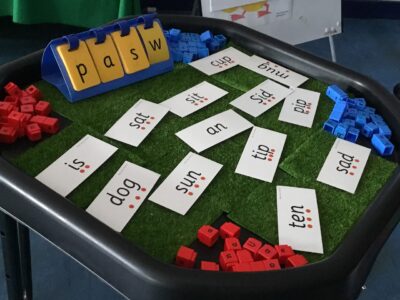 In Key Stage 2 (KS2) reading sessions employ a skills based approach alongside rich book discussions. Through carefully selected texts across the curriculum, children engage in collaborative exploration of characters, themes, and literary elements. Guided by the teacher, the children delve into the intricacies of the text, sharing insights, making connections, and asking questions. These discussions not only deepen comprehension but also foster critical thinking and analytical skills. Through this approach, children not only appreciate literature but also hone their ability to analyse and interpret complex texts independently.
In Key Stage 2 (KS2) reading sessions employ a skills based approach alongside rich book discussions. Through carefully selected texts across the curriculum, children engage in collaborative exploration of characters, themes, and literary elements. Guided by the teacher, the children delve into the intricacies of the text, sharing insights, making connections, and asking questions. These discussions not only deepen comprehension but also foster critical thinking and analytical skills. Through this approach, children not only appreciate literature but also hone their ability to analyse and interpret complex texts independently.
Outside of structured reading lessons and beyond the national curriculum, children are provided with a wide range of additional opportunities to engage with reading. These include chances to read aloud in groups and independently, as well as actively listen to their peers or teacher.
Furthermore, KS2 students are encouraged to read with younger children, fostering mentorship opportunities and nurturing a sense of responsibility and empathy among older children. Alongside these activities, fostering a culture of reading for pleasure is emphasised, encouraging all children to explore books that captivate their interests and imagination. By actively participating in these reading activities, children not only enhance their literacy skills but also develop vital communication and comprehension abilities essential for lifelong learning.
Please click on the links to view our Reading Strategy, Reading in the Key Stage 2, Phonics and Early Reading and Reading Environment.
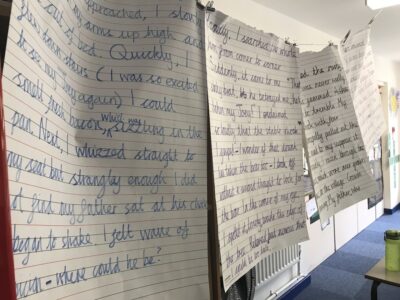
The teaching of reading and writing are closely linked at St Joseph’s Catholic Primary School, where we aim to foster a love for both skills. We aspire to cultivate imaginative, enthusiastic writers who confidently express their ideas and opinions, developing their own flair.
In Early Years Foundation Stage (EYFS), writing instruction encompasses a variety of approaches, including whole-class teaching, independent activities, adult-led sessions, and continuous provision. The writing process begins with a key text and an engaging hook to capture children’s interest. The process unfolds as teachers introduce a model of the story using a combination of pictures and words, encouraging exploration of the text. Through interactive methods such as drama, role-play, and story-based resources, children immerse themselves in the narrative, learning the stories by heart and deepening their understanding. Finally, they are empowered to imitate and create their own stories, fostering creativity and expression in their writing endeavours.

Through a comprehensive approach, we help children develop the skills necessary to write for various audiences and purposes across all curriculum areas. Our commitment to inspiring children is evident in our use of high-quality, challenging class texts, which serve as sources of inspiration for writing across a multitude of genres. Additionally, we emphasise the importance of grammar, spelling, and punctuation, integrating these skills seamlessly into our creative writing instruction. Following the writing process, we guide students through a series of structured stages.

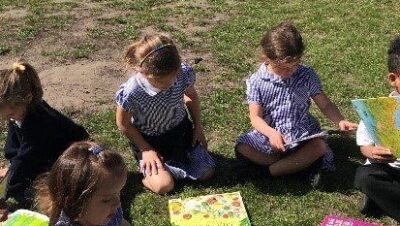
By encouraging students to develop an ambitious vocabulary and providing opportunities for collaborative writing experiences such as modelling of genres, shared writing, and peer editing, we empower them to produce work of exceptional quality.
Spoken Language
Within our curriculum, we provide diverse opportunities for children to engage in debates, discussions, persuasion, structured opinion-sharing, and active involvement in collaborative conversations. Additionally, students across all year groups are encouraged to showcase their abilities in front of an audience, fostering the enhancement of their articulation, expression, and presentation capabilities.
Impact
The impact of our English curriculum extends beyond the classroom, empowering children to become effective communicators, critical thinkers, and lifelong learners.
The impact on our children is evident: they achieve substantial attainment levels by the end of Key Stage 2, surpassing the national average, engage in sustained learning, and acquire transferable skills, including cultural awareness.
Our children also become more confident, fluent readers and they realise the importance of reading for pleasure along with reading for information and knowledge.
The implementation of our wide ranging writing curriculum, supported by the integration of a systemic synthetic phonics teaching programme, taught across all key stages, fostering increased confidence in writing among our children. By upper Key Stage 2, students are well-versed in all genres of writing, allowing teaching to focus on creativity, writer’s craft, sustained writing, and mastery of grammar and punctuation skills, while also promoting cultural understanding through diverse written pieces.
Useful Links:
Curriculum Overviews
